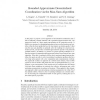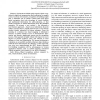145 search results - page 27 / 29 » A Performance Evaluation of the Mobile Agent Paradigm |
EDOC
2004
IEEE
2004
IEEE
Security Patterns: A Method for Constructing Secure and Efficient Inter-Company Coordination Systems
13 years 11 months ago
As the Internet, intranets and other wide-area open networks grow, novel techniques for building distributed systems, notably mobile agents, are attracting increasing attention. T...
AI
2011
Springer
13 years 2 months ago
2011
Springer
In this paper we propose a novel approach to decentralised coordination, that is able to efficiently compute solutions with a guaranteed approximation ratio. Our approach is base...
ATAL
2009
Springer
14 years 2 months ago
2009
Springer
As agents begin to perform complex tasks alongside humans as collaborative teammates, it becomes crucial that the resulting humanmultiagent teams adapt to time-critical domains. I...
ICRA
2005
IEEE
14 years 1 months ago
2005
IEEE
Abstract— Autonomous mobile agents require object recognition for high level interpretation and localization in complex scenes. In urban environments, recognition of buildings mi...
PROMAS
2004
Springer
14 years 24 days ago
2004
Springer
Distributed partially observable Markov decision problems (POMDPs) have emerged as a popular decision-theoretic approach for planning for multiagent teams, where it is imperative f...


